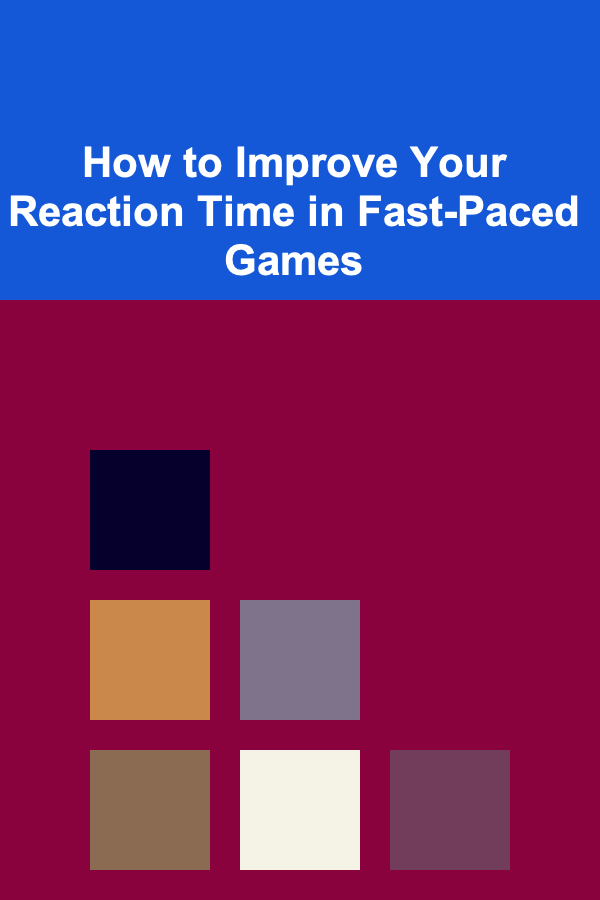
How to Improve Your Reaction Time in Fast-Paced Games
ebook include PDF & Audio bundle (Micro Guide)
$12.99$10.99
Limited Time Offer! Order within the next:

In the world of gaming, split-second decisions can determine the outcome of a match. Whether you're in the middle of a heated firefight, racing against opponents in a fast-paced track, or trying to execute a combo in a fighting game, reaction time plays a critical role in your overall performance. Fast reaction time is often the difference between success and failure in competitive gaming, and the good news is, it can be improved with the right techniques and mindset.
This article will delve into how you can improve your reaction time in fast-paced games. It will explore the scientific basis behind reaction time, the factors that affect it, and, most importantly, practical strategies and exercises that you can incorporate into your routine to see tangible improvements. Whether you are a casual gamer, an aspiring esports professional, or someone just looking to get better at your favorite games, this guide will offer actionable insights.
Understanding Reaction Time
Before we dive into ways to enhance your reaction time, let's first understand what it is and how it works.
What is Reaction Time?
Reaction time is the amount of time it takes for you to perceive a stimulus (such as a visual cue or sound) and respond to it with an action. This process involves several stages, starting from sensory input to motor output. In the context of gaming, it refers to how quickly you can identify an event in the game (for example, an opponent's move, an incoming projectile, or a change in the environment) and execute an appropriate response (like firing your weapon, dodging an attack, or pressing a button).
The Science Behind Reaction Time
Reaction time is influenced by a variety of factors, including your brain's ability to process stimuli and send signals to the muscles involved in your response. There are three main stages in reaction time:
- Stimulus Detection: The brain receives input from the senses (sight, sound, touch) and identifies a relevant event in the game.
- Information Processing: The brain processes the information and decides on an appropriate course of action. This is where cognitive abilities such as focus, attention, and decision-making come into play.
- Motor Response: Finally, the brain sends a signal to the muscles to execute the movement, such as pressing a button or moving the mouse.
Each of these stages can be optimized to improve overall reaction time. Understanding the underlying processes can help in identifying which aspect needs improvement, whether it's enhancing your sensory input, improving your decision-making, or training your muscles to respond more quickly.
Factors Affecting Reaction Time
Various factors can influence reaction time, some of which are controllable, while others are not. Here are the most important ones:
1. Age
As you age, your reaction time naturally tends to slow down. This is because the brain's ability to process information and send signals to the muscles decreases with age. However, while aging can affect reaction time, older players can still maintain relatively high reaction times through training and mental exercises.
2. Sleep and Fatigue
Lack of sleep or fatigue can significantly impair reaction time. Sleep is essential for cognitive function, including memory, attention, and motor coordination. If you're sleep-deprived, your reaction times will likely be slower, affecting your performance in fast-paced games.
3. Stress and Anxiety
High levels of stress and anxiety can increase your reaction time, making it harder to respond quickly to in-game events. This is due to the brain being overloaded with cortisol, which can interfere with the brain's processing ability and slow down responses.
4. Practice and Experience
One of the most significant factors in improving reaction time is experience. The more you practice, the better you become at processing in-game events quickly. Your brain can also build mental patterns, allowing you to predict certain situations and react faster.
5. Physical Fitness
Reaction time is not solely determined by cognitive processes but also by physical coordination. A healthy, fit body is better equipped to react quickly, as well-conditioned muscles can respond faster to signals from the brain. Regular exercise, especially activities that involve hand-eye coordination, can help improve reaction time.
Strategies to Improve Your Reaction Time in Fast-Paced Games
Now that we understand the science behind reaction time, let's explore practical strategies to enhance it. These methods target various aspects of your reaction time, including sensory perception, cognitive decision-making, and motor response.
1. Train Your Reflexes with Specific Exercises
There are numerous reflex training exercises you can do to improve your reaction time. Some of these exercises can be done outside of gaming, while others can be done directly within games.
a. Reaction Time Apps and Games
Many apps are designed to improve reaction time by presenting random stimuli (such as a light or sound) and requiring you to respond as quickly as possible. These apps often track your progress, providing you with feedback on how fast you are improving. Examples include "Human Benchmark," "Reaction Time Test," and "Fit Brains Trainer."
b. Exergaming
Exergaming combines exercise with gaming. These types of games typically use motion-sensing technology (like the Nintendo Wii, Xbox Kinect, or VR systems) to get you physically active while playing. Since you're moving your body and reacting to stimuli in real time, exergaming can help improve both your physical coordination and your reaction speed.
c. Train with Fast-Paced Games
While many games require a combination of different skills, fast-paced games are specifically designed to improve reaction time. Games like first-person shooters (FPS), racing games, and fighting games often test and improve players' ability to react quickly. The more you play these games, the quicker your brain becomes at processing stimuli and making decisions under pressure.
2. Enhance Visual Perception
In fast-paced games, especially shooters and racing games, visual cues are critical. Improving your visual processing can drastically improve your reaction time in these games. Here's how:
a. Train Peripheral Vision
In competitive games, it's important to be aware of your surroundings without focusing too intently on one point. Peripheral vision helps you notice movement in your periphery, allowing you to react faster to threats. To improve your peripheral vision, practice exercises that involve tracking multiple moving objects at once, such as following moving balls on a screen or using specialized training software designed to enhance peripheral awareness.
b. Use a Higher Refresh Rate Monitor
A higher refresh rate monitor (such as 144Hz or 240Hz) can make a noticeable difference in your gaming experience. A higher refresh rate allows the screen to update more frequently, which can reduce motion blur and make fast-moving objects clearer. This clarity allows for quicker reactions, particularly in fast-paced genres like first-person shooters.
c. Optimize Game Settings for Speed
Adjust your game's settings to optimize your reaction time. This might involve reducing graphics quality to ensure smooth gameplay, disabling V-Sync to eliminate input lag, or increasing mouse sensitivity to allow for quicker aiming.
3. Improve Cognitive Speed and Focus
Quick reactions are often linked to cognitive abilities like focus and mental processing speed. Improving your brain's ability to process information faster can significantly enhance your reaction time.
a. Practice Focused Attention
Fast-paced games often require intense focus. You can improve your focus and attention through activities like meditation, mindfulness exercises, and cognitive training games. These exercises help you increase your ability to concentrate and avoid distractions during critical moments.
b. Work on Decision-Making Speed
In addition to focusing on physical reactions, your brain needs to make quick decisions. The ability to quickly assess a situation and decide on the best course of action can drastically improve your reaction time. You can train this skill by playing decision-making games like chess or puzzle games that require quick analysis and strategy.
c. Memory Training
Working on your memory helps you quickly recognize patterns and make decisions based on past experience. By training your memory, you can improve your ability to remember in-game patterns or anticipate opponent behavior. Apps like "Lumosity" or "CogniFit" provide exercises specifically designed to improve working memory, which is essential for faster reaction times.
4. Physical Fitness and Coordination
A healthy body translates to better reaction times. Engaging in physical activities that improve hand-eye coordination and overall fitness can help you respond faster in games.
a. Exercise Regularly
Studies show that physical exercise improves brain function, including memory and decision-making speed. Activities like swimming, running, or weightlifting not only enhance physical health but also stimulate cognitive function, improving your reaction times over time.
b. Play Hand-Eye Coordination Games
Games that require hand-eye coordination can be particularly beneficial for improving reaction times. These might include activities such as table tennis, basketball, or even video games that involve complex controller movements. These activities challenge both your brain and body to work together efficiently, improving overall coordination and reaction time.
5. Maintain a Healthy Lifestyle
A healthy lifestyle that includes proper nutrition, sleep, and stress management is essential for peak gaming performance. If your body and mind are functioning at their best, your reaction times will naturally improve.
a. Get Enough Sleep
Sleep is critical for cognitive function and reaction time. Aim for at least 7-9 hours of sleep each night to ensure your brain is well-rested and capable of processing stimuli quickly.
b. Eat a Balanced Diet
Nutrition plays a key role in brain health and cognitive performance. Eating a balanced diet rich in vitamins, minerals, and healthy fats can support brain function, while foods high in sugar and processed fats can hinder it. Omega-3 fatty acids, found in fish and nuts, are particularly beneficial for brain health.
c. Manage Stress
High levels of stress can impair your reaction time. Managing stress through relaxation techniques like yoga, deep breathing exercises, or taking breaks during long gaming sessions can help you maintain a calm and focused mindset.
Conclusion
Improving your reaction time in fast-paced games is not just about physical speed---it's about optimizing various aspects of your brain and body. From training your reflexes and enhancing your visual perception to improving cognitive function and physical fitness, there are numerous strategies you can use to become faster and more efficient in your gaming responses.
By incorporating these practices into your routine, you'll gradually notice improvements in your ability to react quickly and make better decisions in fast-paced game scenarios. Whether you're looking to improve your skills for competitive esports or simply enjoy a more rewarding gaming experience, enhancing your reaction time will lead to better performance, more wins, and ultimately, a deeper satisfaction with the games you love.
Keep practicing, stay consistent, and remember that reaction time, like any skill, can be honed with the right strategies and dedication. Happy gaming!

A Beginner's Guide to Utilizing Free or Low-Cost Online Streaming Platforms for Entertainment
Read More
How to Build a Pet-Friendly Mudroom for Dirty Paws
Read More
How to Handle Tenant Subletting Requests
Read More
How to Make the Most of Small Garden Spaces
Read More
How to Maximize Small Bedroom Space with Smart Solutions
Read More
The Environmental Consultant's Playbook: Navigating Challenges in Sustainability
Read MoreOther Products

A Beginner's Guide to Utilizing Free or Low-Cost Online Streaming Platforms for Entertainment
Read More
How to Build a Pet-Friendly Mudroom for Dirty Paws
Read More
How to Handle Tenant Subletting Requests
Read More
How to Make the Most of Small Garden Spaces
Read More
How to Maximize Small Bedroom Space with Smart Solutions
Read More